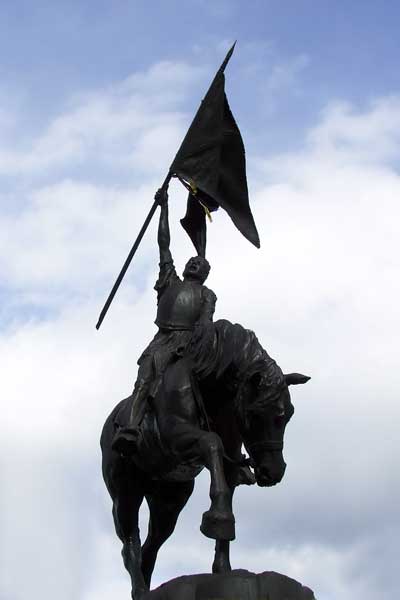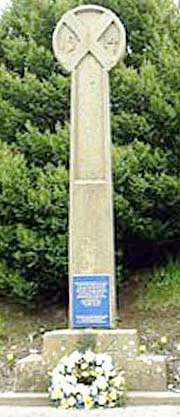HORNSHOLE: THE CALLANTS |
 |
The Battle of FLODDEN (1513) resulted in a crushing military defeat for the Scots, virtually wiping out the cream of the Scots army, both men and leaders. Many thousands of Scots fell, and few families did not lose someone dear to them in the ensuing carnage, indeed the Borders suffered more than most, Sir William Douglas and almost all of Hawick's fighting men were among the dead. This was most of the able-bodied men of the town. There is a famous Scottish lament, a song of mourning, for those killed at Flodden “ THE FLOWERS OF THE FOREST” This left the Borders extremely vulnerable to English raiders and so it was in 1514 that a large party of English marauders wreaked havoc and satisfied their lust for rapine and pillage on poor defenceless Scottish Border towns. The people of Hawick had been scattered to the hills at the approach of yet another English raid, but there were no men left to take up arms and the situation was serious, but the need to protect their town and families mustered deep in the souls of the youth of this district and as night fell they began to gather, they assembled whatever arms they could such as spears, halberts, swords and clubs.and made off to meet the approaching enemy. In their arrogance and lack of foresight the English set up camp for the night neglecting to post sentries to guard their encampment. |
They came upon the English at Hornshole less than a mile east of Hawick. Sleeping of their drunken debauchery, the English never knew what hit them, the lads from Hawick had gathered what horses and livestock they could and charged the camp in the still of the night, crying "Teribys!", their ancient war cry, stampeding the cattle before them. The English never had a chance to wake never mind fight back as they were crushed beneath the hooves of galloping horse and cattle, those few who did were quickly cut down by the hands of sons avenging their fathers slaying at Flodden the year before, they also managed, somewhere in the midst of all this carnage they had created, to capture the battle standard of their enemy, and the sons of Hawick rode back into town, their enemy defeated, and the captured banner proudly held aloft in defiance of English tyranny. These brave lads were greeted with wild acclaim and were rightly acknowledged as saviours of the town. A monument has been erected in memory of their bravery and the action is remembered and celebrated in Hawick every year.This event became part of the COMMON RIDING ceremonies soon afterwards. A flag is proudly carried by the young man (the Cornet) chosen to honour his famous predecessor. One interesting thought about the original Cornet is that he could have been Sir James Douglas. We are not certain what his date of birth is but some people believe he was born in 1498. If this is so then Sir James would have been sixteen in 1514. So he would most certainly have been a member of the Hawick party. Indeed with his family background it is very likely that he would have been the one who took the flag and carried it proudly back to Hawick. |

A diversion to Hornshole is well worth while. From Hawick take the A 698, the Kelso road. In about two miles pass the Trow Mill below on the left. The next minor road off to the left will lead you to the bridge and monument at Hornshole. |
 |
© Paisley Tartan Army 2008-09
